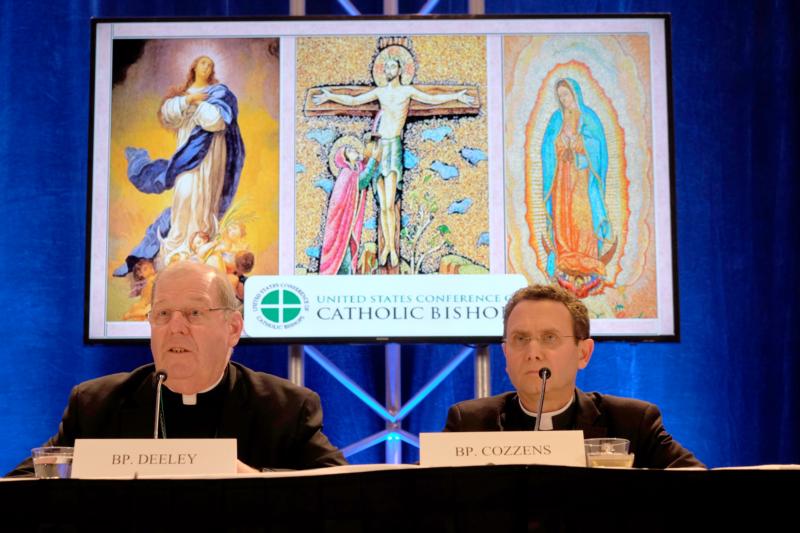
Bishop Robert P. Deeley of Portland, Maine, and Auxiliary Bishop Andrew H. Cozzens of St. Paul and Minneapolis attend a news conference Nov. 13 at the fall general assembly of the U.S. Conference of Catholic Bishops in Baltimore. (CNS photo/Rick Musacchio, Tennessee Register)
UPDATED – BALTIMORE (CNS) — During the second day of their annual fall assembly in Baltimore, the U.S. bishops discussed, even though they weren’t voting on, procedures they could use to restrict bishops removed from their position or reassigned due to sexual abuse allegations or “grave negligence in office.”
(See a related video.)
This protocol can be viewed as a resource for bishops responding to specific cases. It does not offer new penalties or impose an obligation on bishops, said Bishop Robert P. Deeley of Portland, Maine, who is chairman of the the U.S. Conference of Catholic Bishops’ Committee on Canonical Affairs and Church Governance.
“Only the Holy Father can remove a bishop from office,” he said Nov. 13, stressing that the protocols were meant as guidelines pointing out the disciplinary actions that could be taken as part of canon law.
[hotblock]
The document presented to the bishops explains what exactly a resigned bishop, referred to as “bishop emeritus,” cannot do.
Quoting the “Directory for the Pastoral Ministry of Bishops,” written by the Vatican’s Congregation for Bishops in 2004, it notes that the relationship with the diocesan bishop and the bishop emeritus should be “marked by a fraternal spirit.”
The bishop emeritus, it adds, ideally would not interfere directly or indirectly with the governance of the diocese and would carry out his activity “in full agreement with the diocesan bishop and in deference to his authority.”
In cases where a bishop emeritus’ resignation or removal was due to allegations of sexual abuse of minors or sexual misconduct with adults or due to grave negligence of office, it says the diocesan bishop should invite the bishop emeritus to “refrain from the exercise of public ministry.”
If the bishop emeritus does not agree to cooperate, the diocesan bishop should “request further and swift intervention from the Holy See regarding those matters outside his competence.”
“The diocesan bishop will inform the bishop emeritus that public notice will be given concerning the matter, reminding him of the words of Pope Francis, ‘The crimes and sins of sexual abuse of minors may no longer be kept secret,’ and his promise that those responsible will be held accountable.”
[tower]
The protocol also notes that even though the bishop emeritus has the “right and responsibility to preach the word of God everywhere, a diocesan bishop may expressly forbid it in particular cases within the diocese. He may also request that the Holy See extend this prohibition more broadly or deny the exercise of the right entirely.”
Other stipulations include:
— The bishop emeritus can be denied the ability to witness marriages and the public celebration of other sacraments or rites in the church.
— The diocesan bishop may adjust the benefits given to a bishop emeritus such as not funding travel or secretarial assistance.
— Diocesan bishops can decided if “the privilege of burial in the cathedral church is due the bishop emeritus or if other arrangements should be made.”
— Participation in the USCCB plenary sessions would be determined by USCCB president, in consultation with the Administrative Committee.
No vote was to be taken on this protocol since the Vatican Congregation for Bishops asked the USCCB to delay any formal action approving the hand-in-hand protocols pending further review of their compliance with canon law and the pending meeting of presidents of bishops’ conferences around the world in Rome in February.
There was only a brief discussion about the document from the floor Nov. 14. The only bishop who commented was Bishop Bernard A. Hebda of St. Paul and Minneapolis, who pointed out that diocesan bishops don’t always know the reasons a bishop emeritus resigned, and they need some way to resolve this, maybe from a lay commission or national board.
PREVIOUS: Bishops say they face angry questions over mishandling of abuse reports
NEXT: Florida bishop elected next USCCB treasurer starting fall 2019



Share this story